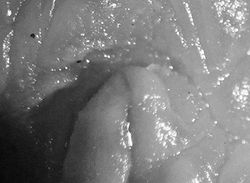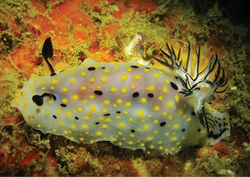Difference between revisions of "Halgerda punctata"
m (Imported from ZooKeys) |
m (1 revision) |
(No difference)
| |
Latest revision as of 16:03, 22 May 2012
| Notice: | This page is derived from the original publication listed below, whose author(s) should always be credited. Further contributors may edit and improve the content of this page and, consequently, need to be credited as well (see page history). Any assessment of factual correctness requires a careful review of the original article as well as of subsequent contributions.
If you are uncertain whether your planned contribution is correct or not, we suggest that you use the associated discussion page instead of editing the page directly. This page should be cited as follows (rationale):
Citation formats to copy and paste
BibTeX: @article{Yonow2012ZooKeys197, RIS/ Endnote: TY - JOUR Wikipedia/ Citizendium: <ref name="Yonow2012ZooKeys197">{{Citation See also the citation download page at the journal. |
Familia: Discodorididae
Genus: Halgerda
Name
Halgerda punctata Farran, 1905 – Wikispecies link – Pensoft Profile
- Halgerda punctata Farran, 1905: 339, pl. 3 figs. 4-7 (Sri Lanka); Debelius and Kuiter 2007: 232 (Sri Lanka); Gosliner et al. 2008[1]: 177 (Sri Lanka).
- non Halgerda punctata. – Rudman 1978[2]: 67, figs. 3A, 7, 8 (Zanzibar) (= Halgerda formosa Bergh).
- non Halgerda punctata. – Gosliner 1987[3]: 69, fig. 90 (South Africa) (= Halgerda formosa Bergh).
Material
Sri Lanka: three pres. specimens 9 × 5 mm, 17 × 10 mm, 20 × 12 mm, and two pres. curled 15 × 10 mm, 15 × 8 mm, Unawatuna, S of Galle, 27-30 December 2010, leg. S Kahlbrock.
Description
The photographs accompanying these five specimens from the type locality are all clearly of the same species: body semi-translucent white with numerous yellow-capped tubercles and few round black spots, tubercles in some specimens arranged in lines approximating ridges of other species of Halgerda. Rhinophores long, tapering; long translucent stalk with black pigment on its posterior surface continuing to lamellate portion, which was black with black knob at tip. First 4-6 lamellae yellow on anterior face and remaining 20-24 lamellae black on all sides. Black spot always present at base of rhinophoral sheath posteriorly in line with black line on stalk, often another black spot laterally or anteriorly. At least one yellow tubercle on rhinophoral pocket rim. The gills distinctive in this species with only four gill branches. Anterior two gills larger than posterior two, inner rachides marked with brown-black line. The anal papilla protruded in some photographs of living specimens, and was identical to Farran’s description of “rather long and tubular, white with a black crenulated margin.”
The preserved specimens are firm, grey-white with pale yellow spots on low tubercles in all but one specimen, which has pale orange spots. All specimens have round black spots. The rhinophoral pockets have a posterior black spot on the rim extending to the mantle on all specimens and an anterior black spot in four specimens. There are black spots on the top of the metapodium, which also has an orange spot at the tip fading into a line along the middle. The branchial pocket is faintly tuberculate and there is always a large round or oval black spot placed anteriorly on the mantle in each specimen, also visible in Plate 30. The gills, retain their black and white markings. The hyponotum is narrow with a few small spots. There are larger spots on the sides of the foot but the sole is bare. The head is reduced, and the mouth is visible with very small rounded tentacles (Fig. 8).
Distribution
This appears to be the first record in the scientific literature of this species since its description. It was originally described from Sri Lanka, and most photographic records are from the type locality, with a few from Thailand and Burma to the east (NudiPixel[4] and Sea Slug Forum[5]). The species described as Halgerda punctata by Rudman (1978)[2] and Gosliner (1987)[3] were re-identified as Halgerda formosa by Fahey and Gosliner (1999)[6], so it appears no one has found or redescribed Farran’s species.
Taxon Treatment
- Yonow, N; 2012: Opisthobranchs from the western Indian Ocean, with descriptions of two new species and ten new records (Mollusca, Gastropoda) ZooKeys, 197: 1-130. doi
Other References
- ↑ Gosliner T, Behrens D, Valdés A (2008) Indo-Pacific Nudibranchs and Sea Slugs. A Field guide to the world’s most diverse fauna. Sea Challengers Natural History Books, Washington, U.S.A., 425 pp.
- ↑ 2.0 2.1 Rudman W (1978) The dorid opisthobranch genera Halgerda Bergh and Sclerodoris Eliot from the Indo-West Pacific. Zoological Journal Linnean Society 62: 59-88. doi: 10.1111/j.1096-3642.1978.tb00523.x
- ↑ 3.0 3.1 Gosliner T (1987) Nudibranchs of Southern Africa. A guide to Opisthobranch molluscs of Southern Africa. EJ Brill, Leiden, Netherlands, 136 pp.
- ↑ NudiPixel website http://www.nudipixel.net/
- ↑ Sea Slug Forum website http://www.seaslugforum.net/
- ↑ Fahey S, Gosliner T (1999) Description of three new species of Halgerda from the western Indian Ocean with a redescription of Halgerda formosa, Bergh 1880. Proceedings of the California Academy Sciences 51 (8): 365-383. doi: 10.1046/j.1463-6409.2001.00054.x
Images
|

